#again this is not meant to condemn Madoka
Text
Homura did nothing wrong. And I stand by that. Because, she didn't do anything wrong towards anyone nor did she do anything with malicious intent. The only thing she did wrong is entirely in regards to herself. Rather than basing Homura's entire character around an act she made out of love or reduce her character to an evildoer with no morals nor love in her heart like some people still do to this day under the poor facade of “valid criticism,” I'm going to explain what Homura actually did wrong in Rebellion and her what her act of selfishness actually was.
What Homura did wrong was condemn herself to suffering as an immortal deity, the Devil whom acts as a rebellion against God, The Law of Cycles, strict laws of the original universe, which included Madoka Kaname not existing. That is what she did wrong, but not in the black and white, Good-vs-Evil way most people interpret this as. Yes, they are meant to be enemies one day, but because God favors rules and always doing the right thing, whereas the Devil favors her desire to stay in a world where Madoka is happy, where her friends are happy, where they are safe and have a chance at a life. A desire for happiness vs maintaining order of a broken world for the greater good, even if maintaining order means making sacrifices and making hard choices that directly rebel against that desire and yearning for happiness.

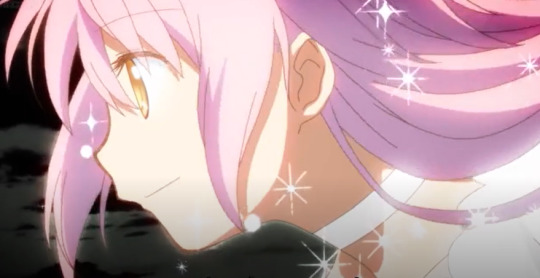
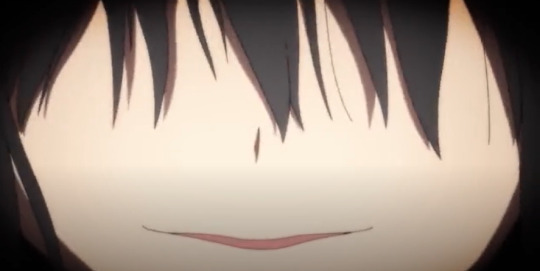
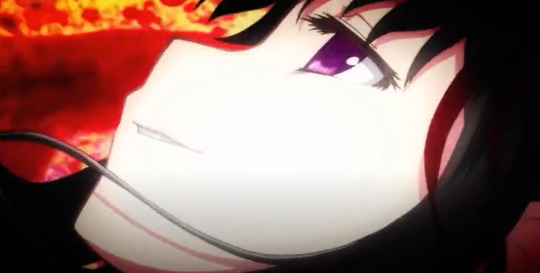

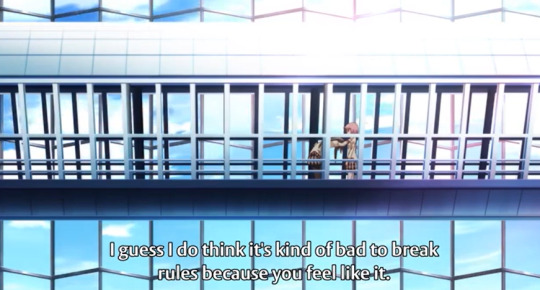
But, here is why Homura is wrong in dooming herself to her fate as the Devil. It's very subtle, but seconds before the Flower Field scene, as they are walking, Madoka turns and tells Homura that it really hurts her seeing her in so much pain and not being able to do anything about it. This may seem like a simple thing a friend would say, but remember that Madoka lost her memories as a goddess. And, as a goddess, she was stuck alone in Heaven having to watch life go by, Homura's life go by, and wasn't able to interfere. Think about that for a second. Think about being Madokami.

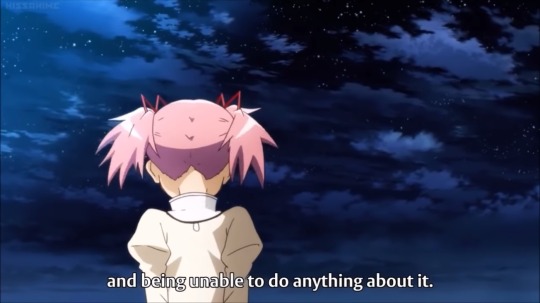
Think about when she could finally understand just how much Homura did for her, just how much Homura fought for her in all those time loops; the moment she's able to reciprocate her feelings, she fades from existence as the consequence. Wanting so badly to comfort Homura as she bears the psychological burden of being the only person to remember her, to know her, to miss her, to grieve and mourn her. Thinking the only time she’ll ever be able to see let alone talk to Homura again is when she’s essentially dying from all the grief, the pain, the guilt, the sadness of not being able to save her from her fate of being a goddess trapped in isolation. Think about that, then look at what she says here again. Of course it hurts Madoka seeing Homura hurting so badly and feeling powerless to do anything about it. Because that's what she's been doing as The Law of Cycles. Much like how she said she'd never make the decision to become a Goddess in the first place a few seconds later, she says this because this is the real Madoka who loves and cherishes Homura, who hates to see her hurt.
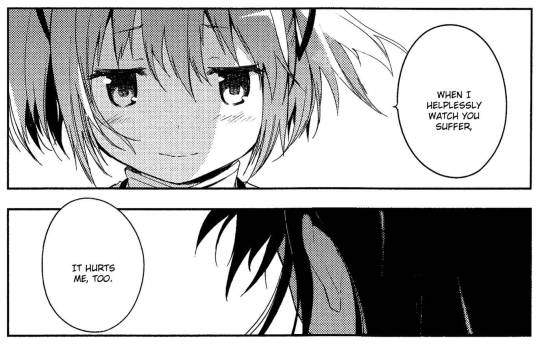
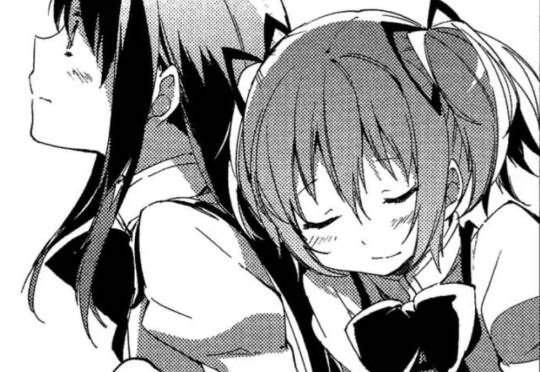
Take that into consideration when looking at what Homura turns herself into at the end of Rebellion, how she's suffering and you can see the exhaustion on her face and in her eyes, how you can see the immortality essentially sucking the humanity out of her to the point where she herself believes she is evil. This was never about Good vs. Evil. This is about Homura hating herself so much not only for being unable to save Madoka, but possibly even for loving her in the first place considering her love is what made her powerful enough to condemn herself to her fate as a Goddess trapped in Heaven with her wish. This is about Madoka hating herself so much to where she only deems herself worthy so long as she's helping others, her self-loathing making her reduce herself to a sacrificial lamb and throwing away her life for the better of everyone else, caring so little for herself and being unable to even fathom that she'd be mourned or grieved if she were to die, thus sacrificing herself over and over, seeing herself as a means to an end if it means freedom for everyone she loves. Madoka has always been there to comfort Homura and protect her since the first timeline. How can she do that if her memories and powers to do so are locked away? She can't. Because Homura doesn't believe she deserves Madoka's love.

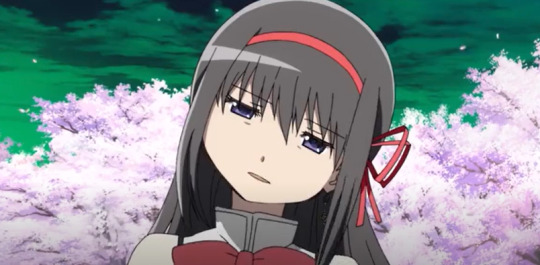


Homura doesn't believe she's worth Madoka's sacrifice in becoming a God and Madoka doesn't believe she's worth Homura's sacrifice in becoming the Devil. Madoka cannot understand that she is so so much more than what she can give to other people whilst Homura is the only one that does. Homura can't understand that dooming herself to immortality pains and hurts Madoka because she can't do anything about it thus she can't save her from her suffering like how Homura ceased her suffering. It's a cycle. A snake eating it's own tail. A pumpkin that spins round and round and round. They're both selfish and they're both selfless. Homura is selfish in the sense that she's not taking into consideration how Madoka would feel if she knew how much she were suffering as the Devil for her sake yet she is being selfless because she's only suffering as the Devil for Madoka and her family and their friends to have a happy life. Madoka is selfish in the same sense that she's not taking into consideration just how psychologically damaging it is for Homura to not only have to watch her die over and over again throughout 100 timelines but to then erase herself from existence with Homura being the only one to remember her and she is selfless by of course only sacrificing herself so much because she cares for everyone and all Magical Girls, Homura especially included. They both love each other enough to sacrifice themselves for the other but they both hate themselves so much to where they believe they are undeserving of the other's love hence they keep dooming themselves to suffering in isolation and in turn dooming each other.
#pmmm#puella magi madoka magica#puella magi madoka magica rebellion#mahou shoujo madoka magica#madoka magica#madomagi#pmmm rebellion#madoka magica rebellion#madoka kaname#homura akemi#madohomu#i dont wanna say they invented doomed yuri but at the same time....#did homura do anything morally wrong? no. she did something wrong in terms of dooming herself to internal psychological suffering#which is something madoka outright says hurts her to see homura go through whilst not being able to do anything about it#homura took away madoka's agency to help her because she feels she deserves this for madoka's sake#homura didn't trap madoka she trapped herself and locked madoka out so that she can't interfere bc she wants her to have a normal life#homura is really not the abusive monster y'all make her out to be the only person she's abusing is herself#she's my self destructive pookie bear and what about it#cw long post
94 notes
·
View notes
Note
Hello! I just finished Madoka Magica (plus movies) and I have trouble understanding main themes, especially when it comes to Homura and Madoka's relationship. Could summarise briefly what are your thoughts on them?
Hello anon!
Thank you so much for this ask! I have wanted to talk about Madoka since forever, but I had never gotten the chance.
First of all, I will mostly concentrate on the series and I will mention the movie only in the last part of the meta. This is because the story told by the series can be considered finished, whereas the one told by the movie is not really over. Moreover, I have re-watched the series recently, while I watched the movie some time ago, so I remember it less.
When it comes to the main themes, I think there are several and they are all highlighted by short lines within the show.
The most important one is this:


Madoka is a story about wishes. To be more precise it is a story about people having to understand what they really want and which kind of wishes can help them reach happiness and a good outcome and which ones do not.
This theme is clearly underlined by the worldbuilding since in order to become magical girls the characters have to make a wish and their powers and abilities are greatly influenced by that wish. The girls have to find something they wish so strongly they can dedicate their whole lives to it without regrets.
This theme is explored in several ways and these different prospectives are linked to secondary themes. Each secondary theme is illustrated by each girl’s subplot and they all come together in Homura and Madoka’s stories even if in different ways.
To be more precise I would say there are two main secondary themes.
1) Growing up and what it means which is introduced through Mami’s arc.

It’s not that it was her dream to work somewhere, but she is still living the way she wants to live. Some dreams can come true that way.
So you can make how you live your dream?
2) The importance of integrating opposites and to overcome a black and white vision of the world which is explored through Sayaka and Kyouko’s inverted arcs.
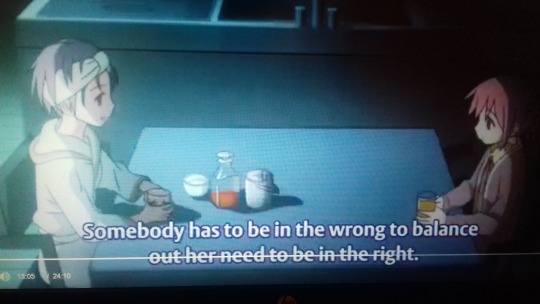
MAMI: THE CHILD BEHIND THE IDEAL WOMAN
Mami is introduced as a mentor figure to Sayaka and Madoka. She is older and appears more mature than the two other girls. Moreover, she offers to guide them and to give them advice.
It becomes soon clear that Madoka wants to become like Mami whom she sees as a sofisticated person and as far more adult-like than herself.
This fits with the image Mami wants others to have of her. This ideal image is shown also by Gertrud, the first witch Mami fights:

Gertrud is the rose garden witch and has several attributes Mami shares as well. This is not surprising. As a matter of fact each witch in the series is meant to underline something about the magical girl who fights her. In other words, they can often be seen as embodiments of the girls’ fatal flaws.
When it comes to Gertrud, I would say the witch is more than anything a representation of some superficial aspects Mami presents herself as having. For example, they are both associated with flowers. What is more, the witch is said to be distrustful and Mami’s fight against her has the girl being extremely cautious and prudent.
This battle underlines Mami’s experience and strength and makes so that Madoka starts to wish to become like her senpai.
In order to do so, Madoka decides to become a magical girl without thinking further about her wish since she only wants to become a magical girl. Mami’s reaction to this is important:

Telling Madoka to wish for a cake is an extremely superficial advice and it is very different from what Mami previously told her two apprentices. This is because in this moment Mami shows that she is really just an extremely lonely girl who wants someone with her. This means that, even if Madoka sees her as an adult, Mami is actually still a child under several aspects and this is why she dies by the hands of Charlotte aka the sweet witch:

Charlotte represents childishness. Her labyrinth is full of sweets and resembles a child’s room or a child’s birthday party.
Let us also consider what her wiki page says:
A line in the design for Charlotte’s labyrinth in the Official Guidebook says “It’s really a delicious cheese cake. My dying mother wanted to eat it, but maybe I should have cured her disease instead. However, that surely wasn’t appropriate.”
This line implies that Charlotte’s wish was to have a piece of cheesecake to share with her ill mother.
It is pretty clear how this wish makes the witch parallel Mami.
As a matter of fact Mami too regretted having wished only for her own survival and not having saved her parents as well.
Mami’s mistake (if we can call it so) is to have made a wish before she could realize what she really wanted. Of course, it is comprehensible why she made such a mistake since she was dying when Kyubey offered to realize her wish and she had no time to think about it.
What is important is that Mami who Madoka sees as a grown-up version of herself is actually a person who was forced to grow up too fast and that, as a result, has not completely developed on an emotional level and this makes her very frail and lonely.
Her “premature” wish is symbolic of this and the fact that she encourages Madoka to wish for a cake means that she is encouraging the girl to repeat her own mistake.
So, in the end Mami dies killed by the embodiment of childishness since she had no chance to conquer hers because of her tragic past.
Her arc underlines the importance of growing up and the fact that an attempt to do so by forcing oneself to adopt superficial behaviours which appear as more mature without solving one’s inner-turmoil and insecurities is not an available option.
SAYAKA AND KYOUKO: BLUE AND RED
Sayaka and Kyouko have inverted arcs and the scene in the church shows it. Here the apple means two different things in relation to the two girls’ character arcs.
1) When it comes to Kyouko the apple represents sin:
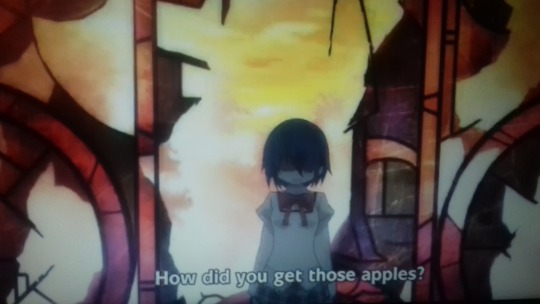
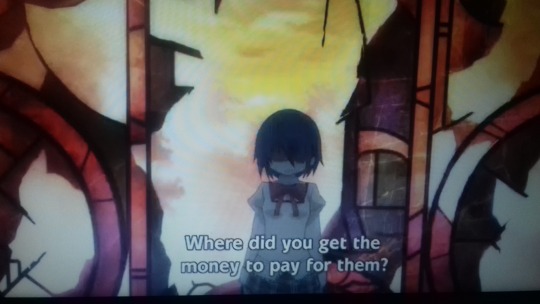
As a matter of fact it is implied that Kyouko stole them and Sayaka calls her out on her selfish way of living showing her that another choice is possible.
2) When it comes to Sayaka the apple represents the knowledge of good and evil:
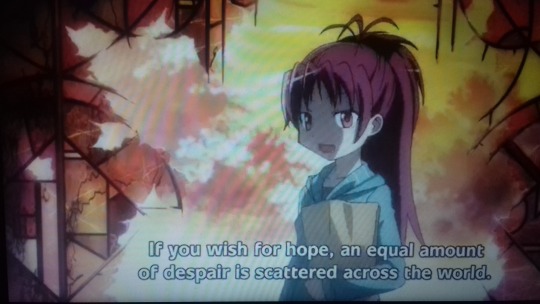
As a matter of fact Kyouko offers Sayaka an alternative and deeper point of view when it comes to what is good and what is bad, but Sayaka refuses it just like she refuses the apple.
Sayaka and Kyouko represent two extreme positions and in order to successfully complete their arcs they should integrate with each other.
To be more specific Sayaka should accept that she is motivated not only by noble and altruistic reasons, but also by selfish ones, whereas Kyouko must realize that her way of life rooted in extreme selfishness is wrong.
However, Sayaka is not able to do so. She refuses the apple and metaphorically what Kyouko could teach her. She chooses to persevere in her fatal flaw and her fight with Elsa Maria is symbolic of this:
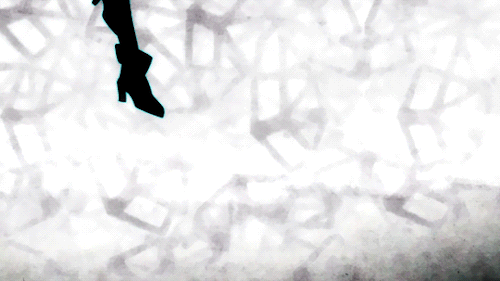
Let’s underline how black and white are heavily used in this scene. These two colours represent Sayaka’s black and white vision of morality which is simplicistic and rigid. Moreover, the witch symbolizes Sayaka’s hypocrisy. As a matter of fact Elsa Maria is praying, but from her back beasts who attack her enemies are born. In other words she gives her back to both who comes to attack her and to her own monstrosity. This is just like Sayaka who is quick to condemn people who think differently from her (like Kyouko and Homura) and who refuses to look at her own selfishness. Moreover, when Sayaka goes against Elsa Maria, the animals on the witch’s back take the shape of snakes and later on of a tree. The snake and the tree are a call back to the Garden of Eden where Adam and Eve are tricked by the snake to eat the apple. Once again the symbolism around Sayaka highlights how she should accept that there is selfishness within herself. If she did, she could gain knowledge and could become wiser, but she refuses to do so.
This is shown also by her choice to suppress her physical pain during the battle. The suppression of pain lets her fight longer, but it is something even Kyubey advises the girl not to do since it would make her slower. In short, pain is said to be useful and necessary and this holds true for negative things in general as the series makes clear. The desperation the girls feel is what can oppose entropy and so save the universe, people are motivated both by selflessness and selfishness, a person can be both good and bad and so on. So, Sayaka repressing her physical pain is symbolic of her doing the same with the negative things about herself she doesn’t want to face.
However, Sayaka can’t keep repressing forever and in the end she realizes the truth:
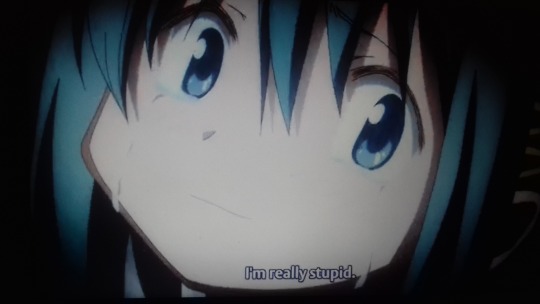
But, when she does, it is too late and she becomes a witch. If she had accepted Kyouko’s advice, she could have avoided (or at least postponed) such an outcome.
As far as Kyouko is concerned she is able to positively develop, but since she is trapped in a system which doesn’t let her any way out she still dies.
Let us consider Kyouko’s fight against Oktavia.
First of all, it is interesting how, differently from Sayaka’s fight against Elsa Maria, this fight uses mostly red and blue.
Red and blue are the colours associated to Kyouko and Sayaka and their use in this fight symbolizes the necessity of an integration and how the good or bad result of this fight relies entirely on this.
In the first part of the fight we can see how there is somehow an equilibrium between red and blue:

As it can be seen the witch is blue, whereas the seats are red, so both colours are used heavenly.
This is because in the first part of the fight Kyouko still hopes that it is possible to bring Sayaka back. This is why she lets herself be hit by the wheels. She sees it as a form of punishment for her past behaviour towards Sayaka. By doing so Kyouko shows to have grown and to have understood her past mistakes. This is underlined both by her speech and by her blood being represented as a mixture of blue and red:
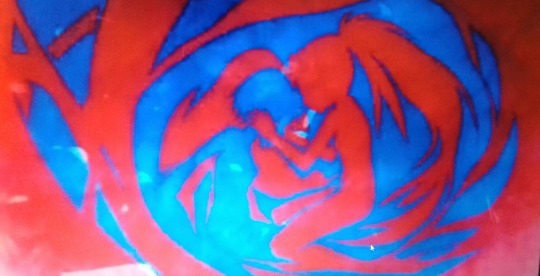

However, the wheels can be also symbolic of the wheels of fate and in this case Kyouko being hit by them represents the impossibility for her to bring Sayaka back and the fact that her hope is vain. This is quickly proven true by Oktavia attacking Madoka. Let’s highlight how Oktavia’s blood when Kyouko cuts her arm is only blue:

Even if Kyouko has grown and integrated her point of view with Sayaka’s one, Sayaka is not in the condition of doing the same and this is why Kyouko’s attempt is meant to fail. At this point the floor breaks and Kyouko falls downstairs where the equilibrium between blue and red is lost since the seats appear blue like the witch:

By this point Kyouko chooses to sacrifice herself and to be together in death with Sayaka. It is interesting how by doing so she starts praying. As a matter of fact finding some form of reconciliation with her faith is one of the most important aspects of Kyouko’s arc. However, what mostly interests me about it is the fact that Kyouko’s position resembles Elsa Maria’s one:
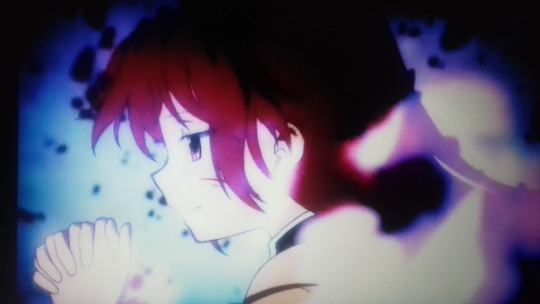
Still, Kyouko is not giving her back to Sayaka, aka to what magical girls are bound to become, but she is directly facing her because she has accepted both her good and bad parts. While she does so Kyouko’s red magic brings more equilibrium to the whole scene with red and blue being in harmony.
All in all Sayaka and Kyouko’s stories are meant to convey the importance of integrating between opposites, to face the negative parts of oneself and how bad and good can be side by side and they can be difficult to separate.
Sayaka and Kyouko’s wishes are used once again to communicate this idea as well.
Both girls made a wish for someone else and ended up suffering for it, but the reason of their suffering is different.
Kyouko’s mistake was to think that what she wanted was what his father wanted and that his father would have been happy if magic could make people listen to him.
Sayaka was right to think that Kamijo would be happy to have his hands healed, but she refused to admit that a part of her hoped to receive a reward for such a wish and to be more specific that she hoped that Kamijo would love her.
Sayaka and Kyouko’s wishes underline the grayness within the ideas of selflessness and selfishness and how these two concepts are often both present and intertwined in people.
MADOKA AND HOMURA: A DIFFICULT CONCILIATION
Mami’s arc explores the theme of growing up and Kyouko and Sayaka’s arc the importance of reconciling good and bad, selfishness and selflessness.
Both these topics find a resolution through Madoka’s final wish.
As a matter of fact Madoka chooses to erase all the witches and to dedicate her own life to it.
The idea of making of one’s lifestyle their own dream is something which has been touched at the beginning of the series. There, Madoka wanted to make of her magical girl style of life her wish, but back then she was still looking at things in a superficial way. As a matter of fact Madoka was trying to solve her self-esteem and self-loathing problems by acquiring magical powers. By the end of the series she doesn’t become a magical girl in order to grow up, but she can become one because she has grown up.
Similarly, it is important to note that Madoka’s wish doesn’t erase evilness or desperation or the negative things happening in the world. This is because the series underlines how these things are a part of the world itself and can never be completely destroyed as Sayaka’s attempt shows. So, Madoka chooses not to eradicate the magical girls system. After all, if she did the universe would have been ultimately destroyed as Kyubey explained (alternatively the Incubators would have found another cruel way to collect human energy). After having considered this, Madoka decides to respect the will of other magical girls to risk their lives to realize their wishes and simply makes the system less cruel. The ending suggests that the system has been changed and that now magical girls go around fighting monsters representative of human negative emotions. By doing so, they collect energy which is then given to the Incubators to use. They do something which is much closer to what magical girls typically do and they are not tricked into becoming witches by the Incubators anymore.
In other words, Madoka’s wish embodies the themes of the series.
Another important thing about it is that by making the wish Madoka becomes active.
Throughout the series Madoka’s passiveness and her self-loathing have been two of her biggest flaws as her meeting with Elly shows. The witch catches Madoka and forces her to see Mami’s last moments again by showing them on the screens. Madoka being completely helpless and prey of the witch could symbolically represent her feeling of being useless and without worth since she thinks she is not able to help people. As it is clear she overcomes these feelings in the finale.
Let’s now consider Homura and how she herself is linked to the two themes underlined above.
Homura’s wish is born by the unwillingness to accept Madoka’s death, so by her being unable to move on and this is symbolically shown by her repeating the same month several times.
So, Homura’s wish negates what the series wants to convey since 1) it is born by Homura’s refusal to accept something negative which happened to her (Madoka’s death) and 2) it literally makes so that the time won’t keep flowing and so that Homura and all the other characters won’t go on and won’t grow up.
This is shown also by the witch which represents Homura’s character flaw aka Walpurgisnacht.
Let’s consider what Walpurgisnacht’s wiki page says:
She will turn all of fate’s misfortune to nothing.She will flood the earth with magic,and take all of humankind into her play.A moving stage construction.
If everything is a play, no unhappy things will exist.It may be a tragedy, but it’ll all be part of the script.
The play stops on Walpurgisnacht,and the earth does not turn even once more.The story will not change.Tomorrow, and the day after, is the night of Walpurgis.
And also:
She symbolizes the fool who continuously spins in circles.
The fool who continuously spins in circles is a reference to Homura and to her quest to change the future by continuing to live again and again through the same situations.
What Homura does is similar to Walpurgis’s attempt to turn the whole world into a play because by making reality into fiction people won’t be forced to truly accept the bad things which happen to them. As a matter of fact every time Homura reaches a bad ending all she has to do is to refuse the outcome and to go back in order to change it until she reaches a situation she can accept as reality. However, no matter how many times she repeats things, she will never be able to obtain what she wants.
In short, whereas Madoka affirms the series’ themes in an active way through her wish, Homura has to convey them in a passive way by giving up her wish to save Madoka. This is because growing up means both to find something which is worth to fight for, but also to realize when it is time to give up.
Madoka and Homura represents these two different kinds of growth.
At the same time though, Homura’s wish is not condemned as useless by the series.
In order to understand it, let’s consider Madoka’s witch form aka Gretchen.
The wiki says interesting things about this witch:
Witch of salvation. Her nature is mercy. She absorbs any life on the planet into her newly created heaven–her barrier. The only way to defeat this witch is to make the world free of misfortune. If there’s no grief in this world, she will believe this world is already a heaven.
And also:
According to witch animator and designer InuCurry, Walpurgis Night’s and Kriemhild Gretchen’s silhouettes are supposed to make a pair.
Puella Magi Production Note further reveals that Kriemhild Gretchen is meant to look like the lower half of a sand timer, while Walpurgis Night looks like the upper half. Interestingly, Homura’s shield has also been described as a sand timer.
In short, Madoka’s witch form is meant to show that also a noble feeling like mercy can lead to desperation and destruction if it is imposed and extreme. Moreover, Gretchen seems to be a witch which is complementary to Walpurgis i.e. the embodyment of Homura’s flaws.
In other words, Madoka and Homura are opposites and alone would not have managed to do much, but the union of their efforts and the integration of their different world views led to some kind of result.
As a matter of fact, Madoka’s wish to sacrifice herself for others would not have accomplished much if fueled by an absence of self-worth. However, when coupled with Homura’s feelings it let Madoka change the world. It is thanks to Homura, thus, that Madoka became so powerful in the first place and could finally grow up. In other words, symbolically, Homura’s love gave Madoka the self-worth she lacked making her a better person, so that she could then help the whole world.
Their two wishes, one born out of a selfless desire to help everybody and the other born by the selfish will to twist time in order to help one person are complementary and, in different ways, lead to the series’ ending.
This resolution is sealed by Madoka giving Homura her ribbons.
The ribbons have a double meaning.
1) When it comes to Madoka, her giving them to Homura underlines her finally growing up. This is because they were given to her by her mother at the beginning of the series, so Madoka finally giving them to someone else shows that she doesn’t need to depend on a parent anymore.
2) When it comes to Homura, they represent her relationship with Madoka and are a memento of her friend. After she receives them Homura shows to have accepted Madoka’s wish to fight in order to protect the world and she is determined to fulfill it. Basically, the ribbons represent Madoka’s legacy.
I have analyzed the series, so I will now do a short section dedicated to the movie and to Homura and Madoka more specifically.
In short, Homura regresses throughout the movie. Her growth lies in letting Madoka go and in partially accepting her pov. In the series she did so even if in a passive way (meaning she was not given any other choice) and in the movie she changes her mind and acts to change things.
Basically the movie shows that a new conflict will be born in the future between Homura and Madoka and the root of this conflict will be this:
H: “Kaname Madoka, do you treasure this world? Do you consider stability and order more important than desire?”
M: “Well, I…Um…I do treasure it. I guess I do think it’s kind of bad to break the rules because you feel like it”.
H: “I see…Then I suppose one day you will be my enemy as well”.
Homura despises the world which makes people and Madoka especially suffer and thinks that desires should be fulfilled no matter what, whereas Madoka treasures the world despite its flaws and thinks that to respect its laws is more important than the satisfaction of one’s desires.
They are two opposite visions which will lead the two girls to fight each other.
What follows this conversation is an inversion of what happens at the end of the series since Homura gives Madoka her ribbons back.
Once again this has two meanings.
1) Homura refuses Madoka’s POV she had previously partially accepted and in this way she also gives up her friendship with Madoka since she affirms they will be enemies.
2) In a sense the ribbons are symbolic of Homura tying Madoka and imprisoning her. Let’s underline that when Madoka is about to awake her true powers her pigtails are getting loose. However, Homura stops Madoka by embracing her and later on she ties her hair with the red ribbons. Moreover, as explained above, the ribbons are symbolic of Madoka’s childishness, so this means Homura is making so that Madoka remains stuck in her childhood. This is coherent with Homura wanting to protect her by any hardship which is something not only impossible, but also detrimental for a person’s growth.
This scene is also interesting because it is also a call back to a previous one in the movie:
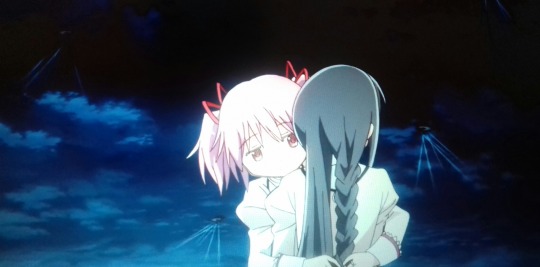
As a matter of fact Madoka too at one point tries to calm Homura down through tying her hair and Homura is tempted to lose herself in such a dream, but in the end she refuses this consolation.
This leads us to explore what is probably the main problem of Homura and Madoka.
Basically they both have a very low self-esteem and in order to prove their worth they are both determined to be useful and to succeed in their mission as magical girls. However, Madoka’s mission as a magical girl is in opposition with Homura’s one and this leads the two girls to never be completely satisfied at the same time. If you notice, both in the series and in the movie, when Madoka is active and confident Homura is unsure and lost and vice versa. Homura especially needs Madoka to be safe in order to prove her self worth and this is a problem because it makes so that it is impossible for Madoka to claim any form of agency since it will lead to Homura being left unsatisfied.
So, if we will ever have a sequel I think it will explore the conflict between Homura and Madoka and will offer a new integration between their two points of view other than Homura actively letting go of her wish this time.
Thank you for the ask and I am sorry for the long answer, I hope you enjoyed it!
#puella magi madoka magica#pmmm#puella magi madoka magica meta#pmmm meta#madoka meta#homura akemi#madoka kaname#miki sayaka#kyouko sakura#mami tomoe#asksfullofsugar#anonymous#my meta
284 notes
·
View notes
Text
Untangled: Christians Blogging about Yaoi and Yuri

Recently on Anime Pop Heart, we received the following anonymous question:
Why do you repost/blog about anime that are clearly homosexual in nature, such as Given? It could send the wrong message to people who do not know or are confused about whether homosexuality is a sin or not. I’m not trying to cause anything, but I just wanted you to be aware. Thank you! I really appreciate the wonderful posts y’all write!
Thanks, Anon! I appreciate the question, and it’s an important one—so much so, that I decided to address it here on Beneath the Tangles, which is a better platform for a long form comment. I also hope this can lead to some discussion—it was already taken up on Anime Pop Heart, where another Anon came in full force, inferring that posting about Given indicates an acceptance of sinful lifestyle. Let’s pull back for a second here, though, and take a wide-angle look.
Anime is an art form created almost exclusively by non-Christians, filled with material that doesn’t reflect a Christian view and often glorying in themes and ideas that scripture might condemn. We find, for instance, that Puella Magi Madoka Magica makes for a brilliant allegory of Christ’s sacrifice, but it also exists in a world without the Christian God with a story that is more properly aligned to Buddhism than Christianity. A refusal to acknowledge God, and even put characters in the place of God, seems a weightier issue than a show espousing same-sex relationships. Yet, Madoka has become a “classic” among Christian audiences.
Whether with thought and critical thinking or not, Christian otaku have already accepted that these series are made outside of their faith’s scope and often contradict or are otherwise at odds with a Christian worldview. So, should you trash all your anime DVDs and cancel your Crunchyroll subscription? I would recommend you stay your hand and keep those Evangelion DVDs from the trash can, and instead spend some time considering media in general. I think we all understand that western media, even steeped in a culture where Christianity is the main religion, often challenges the faith more frequently and purposely than eastern media does. I’ve also made the argument that even “Christian programming” is off the mark, often lacking the creativity that should be associated with our God and filled with imperfections since they are made by sinners like you and me. There is no perfect, holy programming.
That doesn’t mean we need to be all in or all out—sometimes we need to draw a line. A typical Christian response may be to say no to yuri and yaoi anime, just as it would say no to hentai. But what of very violent shows? What of ecchi series?
We recently asked about the latter on Facebook:
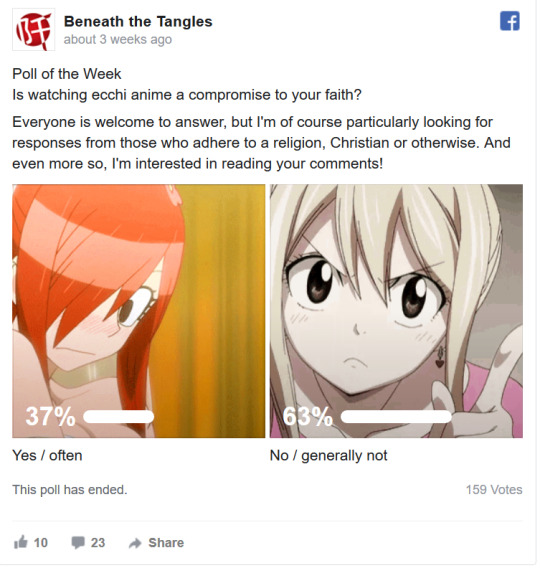
63% of respondents believe that ecchi anime are generally or never a compromise to their faith. Think about this for a minute—shows which glorify sex and are full of fanservice meant to elicit lust don’t cause one to sin, but a yaoi series that may contain none of those elements does? I think that some of what I see as a dichotomy here can be explained by the personal lines we each draw when it comes to what we consume. For instance, series that are overly dark and contain gore are no-no’s for me, because they affect me personally and tempt me to sin far more than ecchi series, even though I generally stay away from those as well. However, others may not be affected by either splatter anime or highly sexualized ones. When it comes to yaoi, a series may tempt you to sin, in which case Christ tells us to take extreme measure. But if it does not, you may be missing something special by just skipping out on shows because they’re classified as yaoi and yuri.
I watch anime not just for entertainment, but because I love the ability for these stories to reveal something about humanity, the world, and ultimately, God. No, Trigun isn’t about worshiping Yahweh, but the grace of God has been reemphasized to me over and over by Vash’s actions. And no, Daikichi and Rin don’t ever attend church, but their relationship (at least in the Usagi Drop anime) serves as a modern day parable illustrating God’s adoption of us into his family. And while I haven’t personally watched Given, I’ve heard that it has a lot of goodness to show us as well, as long as we have eyes to see and as long as other elements in the series don’t draw us away from Christ.
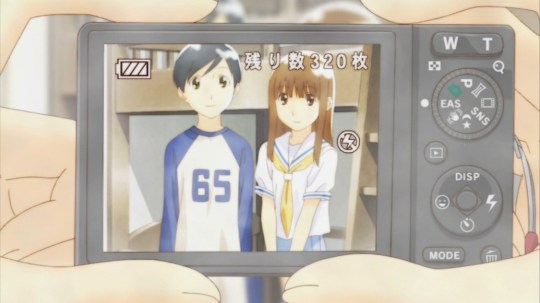
Hourou Musuko is a show featuring transgender, homosexual, and even Christian characters—and it is wonderful.
And that returns us to the idea that each of us needs to be very aware of what our “lines” are when it comes to entertainment—movies, books, and anime. What doesn’t harm one may harm another. The original Anon inferred this as well when she says we might be sending the “wrong message.” This is an important point, and one again stressed in scripture about what our responsibility is to our brothers and sisters:
Do not cause anyone to stumble, whether Jews, Greeks or the church of God—even as I try to please everyone in every way. For I am not seeking my own good but the good of many, so that they may be saved. (full passage)
Going by this verse, I could easily make a justification to avoid any yaoi or yuri series. I’ve explained already that such series don’t necessarily lead to sin, so my conscience is clean in having freedom to try such shows. But others may stumble just by knowing that we don’t necessarily shy away from them. This could lead some to make the assessment that yaoi is okay and the jump to homosexuality isn’t a sin.
However, I trust our readers and followers are more critical in their assessments than that, that they don’t take our views so blindly and instead are careful in how they approach their faith and how they weigh what the world says (including what we say) against what God tells us through scripture. And even if not, we here at Beneath the Tangles simply cannot write for all audiences. Yaoi would be inappropriate, in my view, to introduce to elementary-aged students in a Christian household—they’re not ready to make such decisions. But I’m not writing for those kids, even though some of them will read our blog. I’m writing to those at a certain level of maturity, give or take, and trusting you to let the Holy Spirit convict, guide, and lead you to grow. If yuri series aren’t for you, if they cause you to sin, if you just believe they’re abhorrent to God, then exhort you to avoid any blog posts we have about such shows (which, to be fair, are rare or non-existent any way); and if you can partake of those series without sinning and want to draw in content that helps you grow in your faith, then read our posts. Make the decision, and allow us to function as a resource than can help you with your faith.
Ultimately, that’s what we’re here for you—to help Christians grow in their faith through use of anime, and to lead non-Christians to Christ through the same. And I believe it’s a testimony to God’s power than even in this crazy day and age, even through a weird art form created in a land that persecuted Christians to near extinction in their country, even in shows emphasizing themes and ideas contrary to scripture, God can and will work.
-----
Note: All this said, we remain careful in choosing which series we “recommend,” as opposed to watch we simply write about. We’ll make best use of our judgment and prayerfully when it comes to challenging topics. Also, our staff has varying views and will not all agree with my on this assessment—we agree, rather, on our mission, vision, and values, and on several statements of faith that are a requirement to join the team.
11 notes
·
View notes
Text
for you, the world
Title: for you, the world
Summary: Sometimes, he wished someone out there could grant the wishes of a god. Time Loop AU
Genre: Angst, Romance
Pairing: MC/Leon
Rating: T
a/n: Happy Belated Birthday @maidofstars!! I’m sorry this came really late, but I wanted this to be good lmao! This fic was heavily inspired by Madoka Magica’s 3rd Movie! I thought it would be fitting for Leon :’)
Also a big thank you to @kiserusmoke for getting my ass into overdrive
also @angel34jolly-blog, i finally made a Leon fic :D
?.
The wishes always came to Leon in endless streams.
As a Wishes minister, he’d heard them all before. The annoying lottery wishes, the please-let-me-get-an-A wishes, the heal-my-dog wishes—he’d heard everything, and frankly, he was tired of doing so.
None of those could hold a candle to the sheer amount of love wishes that landed on his desk, however.
Humans never seemed to stop wishing about love, and that annoyed Leon to no end. There was always someone out there who wanted love to be shaped according to their terms, without any consideration for anything else. Leon thought there was nothing more disgustingly human than that.
It came to a point where he had to put his foot down and ban granting love-related wishes in the department. He was sure the other gods had their misgivings with this development, but no matter. His word was the next best thing to the law in the heavens.
“Leo, don’t you think you’re being a bit hasty with this decision?” Karno asked him. Typical of the Cancer god, Leon thought. Always the only one brave enough to question me.
“Of course not. There’s no merit in granting wishes that aren’t worth anything.”
It was true. Leon couldn’t think of any goldfish wishes that didn’t have some hint of human greed or selfishness in them. The mere thought of granting any of them left a bitter taste in his mouth.
Except, maybe, for one wish.
There was one goldfish whose wish didn’t disgust him immediately. The human—a little girl—always looked at the stars with her hands clasped and asked for the same thing—
“I wish something wonderful would happen.”
It was vague, childish even. But it held the hopes and dreams of a little goldfish with stars in her eyes.
Maybe just once, he’d grant this wish.
i.
That trickster of a king must’ve had a twisted sense of humor if he thought sending Leon on Earth to erase his mark of sin was funny.
But sending him on earth knowing full well that he’d fall for the ex-goddess? The king was an absolute bastard.
The goldfish, in her enthusiasm, had invited to him to attend the Star Festival with her. He willingly chose to indulge her—after all, this was the last thing he could do for her before he’d face the wrath of the heavens. He had to leave her with something, and all he was allowed to give was a memory worth keeping.
Unfortunately, their evening was ruined when Minister Ponytail decided to make himself known.
“Lay a hand on her and you’ll regret it.” Leon was smirking, but his words had no mirth in them whatsoever.
“…Because you don’t want any harm to come to her?”
For the first time in the long time they’ve known each other, though he’d never admit it, Leon agreed.
Leon knew, deep down, that Zyglavis did nothing out of malice. He only acted out of a sense of misplaced duty and honor, not to mention the fact that he was incapable of seeing things beyond black and white logic.
That, Leon thought, was his greatest mistake. He would never beat Leon as long as he lived by that outdated mentality.
Leon was already preparing to block Zyglavis’ attack, but he underestimated how foolish she was.
(And how selfless she was.)
Humans were not supposed to have holes in their chests, but here she was, charred skin surrounding the gaping wound right on her heart. She slumped onto the ground, and he was reminded of the little fish they won earlier, now flapping helplessly beside her.
“Why did she…?” Not even Zyglavis could’ve predicted that she’d try to shield Leon from the attack.
But none of that mattered right now.
Leon felt his suppressed power well up in him in waves, and despite all the chaos around him, he could only see red. How dare this insolent god hurt her, how dare this filthy world reject her—
How dare you for not protecting her, Leon.
“Leon! Don’t do this, there are humans here!” Zyglavis’ screams were already white noise to him.
He remembered a wish long ago that he promised himself he’d grant.
If there was anything Leon was completely sure of, it’s that he would do anything to make sure it would come true.
Even if I have to do it over and over.
ii.
This time, he was able to save her before Zyglavis’ attack reached her. Only, in her attempt to keep him from going berserk at Zyglavis, her body absorbed all the impact from his unleashed power.
This time, it was his fault.
But despite all that, she forgave him. Even when he was being dragged off to the heavens to stand trial, she didn’t blame him for causing her pain. Hell, she even begged him to take her with him.
(How could he compete against that?)
In the end, both of them stood before everyone in the Punishments court. She was beside him, obviously unnerved by the scrutinizing looks of all the gods. Still, she met all their gazes head-on with the hidden strength he came to love.
That’s my goddess.
He was, as the humans would say, in deep shit. But seeing her stand her ground against the likes of the ponytailed stick-up-the ass gave him a reason to smile through all this.
“The time of judgement has arrived,” Zyglavis’ stern voice rang across the hall. “You were exiled to Earth for committing the sin of defiling a goddess. However, instead of spending your time on Earth atoning for your sin, you broke a law of the heavens.”
She trembled beside Leon, holding his hand tighter—tighter than she did the first night they met.
“Do you admit to this sin, Leon, wild lion of the heavens?”
He smirked. Of course, he knew exactly what he did better than anyone. The old adage of the heavens, “a god must not love a human more than any other,” rang in his head, but he didn’t bother entertaining the thought further. In fact, he’d abandoned that thought long before he arrived in court.
You’re the only person here that matters.
“You’ve got to be kidding me, Zyglavis,” Leon said, giving the other god his best sneer. “I never denied that I broke the law.”
“Tread carefully, lion—”
“But the fact remains that she helped me erase my sin. So make of that what you will.”
The furrow in Zyglavis’ brow only grew more pronounced. “Of all the gods here, your power is paramount to the balance heavens.”
Again with his “balance” foolishness—
“That’s no concern of mine," Leon said.
“Watch your mouth,” Zyglavis scolded, his voice reverberating. “Despite everything, you are still the head of the Department of Wishes—for the time being. I will have you decide now. God or human—which do you choose?”
Leon knew this was a trick question. Should he choose to be human, he would lose his powers, thereby rendering her unable to return to Earth. If he chose to remain a god, he would have to do the unthinkable.
“…Are you asking me to kill her?” His voice took a deadly edge.
“If you don’t, then the only path left for you is extinguishment.”
She panicked visibly at that, and Leon could already read her thoughts—all of which asked him to kill her and save his own life.
Like I would ever let that happen.
She’d told him before that she never wanted to be separated from him, even at the cost of her life. As a wish-granting god, Leon could only do what he did best.
The space around him shifted. The light around him grew to a blinding gold, and he knew the end was near. Yet, none of that mattered to him.
To hell with the King, the gods, and the heavens. If he was a sinner, then so be it. Let the world condemn him, so long as she could have another chance at happiness.
And I would do it again, just to see you smile.
iii.
He was back at the planetarium again, just like the first night they met.
True to her nature, she leapt off the planetarium’s balcony to save a little boy from falling. The force of the boy’s fall was too strong, and just like before, she was pulled over the side of the roof, falling to what could have been her untimely death.
But unlike before, he wasn’t the god who saved her this time.
Leon distinctly heard her heart call out for Huedhaut.
True enough, Hue responded at a moment’s notice, and Leon had never seen the god of Aquarius look so desperate before.
Not since he’d lost that person all those years ago.
Hue held her carefully, guiding her gently back to the planetarium. She, in turn, clung onto him as tightly as she could.
At the back of his mind, Leon always knew that she and Hue had a connection of some sort. He wasn’t a fool not to know that Hue’s missing stars and the reincarnated goddess’ existence were related. In fact, Leon never missed the way Hue looked at her longingly, as if she would disappear from his sight if he didn’t watch her.
Still, seeing them together still sent a stab of pain in Leon all the same.
He supposed this world wasn’t the one meant for him. If he was right, then she was meant to be with Hue in this world. It wasn’t Leon’s place to interfere. He would stay in the sidelines and support them. All that mattered was that she ended up happy.
However, Fate loved to play tricks on the good, and she was the greatest of the good.
Huedhaut returned to the heavens after his mark of sin faded, but her heart didn’t sit well with his absence. Day after day, the rain never stopped its barrage on Earth—a clear reflection of her feelings.
Feelings Leon knew all too well.
Zyglavis, ever the dutiful square, gave her the option of letting Huedhaut die to save Earth, or to let herself die to save both him and Earth.
And, just like always, she gave herself up so easily.
(He wondered if this unending agony was what Hue had to live with for eons.)
iv.
Leon remembered an interesting question Vega posed one day.
“If the gods grant the humans’ wishes, then who grants the gods’ wishes?”
For the life of him, he didn’t know. Supposedly, gods were existences of the highest order; they were at the pinnacle of the everything, able to manipulate the laws of creation at will.
Yet the only wish he’s ever had, the only person that made his world have any semblance of meaning in it—
“I’m sorry, Leo,” Karno had his eyes closed in sorrow. “She was trying to save a boy from a moving car, but…”
He didn’t need to hear Karno continue. He’d already seen her body sprawled on the crosswalk, blood and viscera splattered everywhere.
Humans prayed to the gods to grant their wishes, but Leon had no one to pray to.
v.
Gods didn’t fail.
They were perfect beings that naturally excelled at everything. That was how everything was and always will be.
But after holding her limp body against his chest for the nth time, Leon didn’t think so anymore.
vi.
If this world was the King’s doing, Fate’s doing, or some sick being’s doing, then they were truly despicable in the worst ways.
Leon looked everywhere, but he couldn’t find a single trace of her in this world. He went to the planetarium and asked her friend Hiyori about her, but she only told him that no one of that name ever worked there. Her ever-cozy apartment was vacant, with no sign of anyone ever living in it. Hell, he even checked her family registry only to find out her parents never had any children.
It was utter blasphemy for her not to exist. No one among the gods could fathom his grief, not Karno, not Zyglavis, not even Hue. To them, Leon holing himself up in his private flower field was just another show of his apathy toward everything and not a means of escape from his dreadful reality.
So be it.
He would leave this world and let it rot like the trash it was. A world without her in it wasn’t one worth living in.
vii.
Leon already stopped counting when he reached the thousands. Snapping his fingers was growing tiring at every failure he’s lived through, and the gods have noticed his growing disdain for the universe.
The King had told him once before that gods loved all beings equally.
However, all Leon could think of was how fast this world could end.
viii.
Supposedly, as a god, Leon had all the time in the world. In theory, it made sense. Gods were immortal by nature, and the long stretch of time was nothing to the lifespan of a god.
But if Leon was being honest, his greatest enemy wasn’t the Department of Punishments or even the King.
It was time.
There was never enough time to prepare himself for her inevitable death. There was never enough time for him to save her.
(How he wished to grab time by its throat and crush it with his hands, so that it would know at least a fraction of his pain.)
ix.
Maybe, Leon thought, he should just ask her to wish for his unconditional success.
(He stopped for a while and asked himself if it was possible for gods to go insane.)
x.
Why?
Why are you still so selfless even after everything?
xi.
I’m sorry. I’m so, so sorry.
xii.
He still had one last option, one last trump card he’s kept to himself all this time. If he used it, he’d be breaking not only the laws of the heavens, but that of the universe as well—of reality itself.
But that didn’t matter to him. It never did.
He’d told her this before, and he’d say it forever:
If loving you is a sin, then let me be a sinner.
xiii.
None of the other gods could hold Leon down in his divine form. The King himself tried to step down and intervene, but Leon was stronger. No one in the world could ever hope to understand his grief.
It was for her alone.
He would become an existence far beyond the god of Leo; he would be her direct antithesis—selfishness itself. The universe would be rewritten according to his terms, and his terms alone. She would never again be hurt by anything or anyone.
He would specifically make it a universal law to never have her be hurt.
“Please, think about what you’re doing!” Karno yelled at him. “You can’t just destroy everything like that!”
Leon only held her in his arms tighter, the light around them becoming blinding.
Even the scorpion couldn’t hide his panic. “You’re messing with shit beyond our realm!”
“Leon, this isn’t what I—” she tried to plead with him, but he only smiled at her.
Now I can finally—
“Leon! Stop!”
—grant your wish.
xiv.
He sat alone on his throne, marveling at his new creation. The threads of his new cosmos were beginning to form, and he was satisfied. Everything was just as it should be.
“Leon,” said a low voice from the end of the hall. It was Huedhaut, still in his divine form.
How impertinent.
“Do you have any idea what you’ve done?” Hue said. His eyes blazed a cool, blue fire.
“Oh, I do. But feel free to enlighten me.”
“You—you’ve tampered with something that shouldn’t be touched,” he said. “You may be a god, but you have no right to just change the order of the universe—even if it was for her!”
I would’ve expected you of all people to understand, Hue.
“Maybe not. But well, I’m not a god anymore, you see. I’ve become something far beyond that, so I doubt it’s in your best interest to defy me like this,” Leon said, a deadly grin on his face.
“I won’t just let you do this, Leon.” Hue channeled his energy into an orb, aiming it at Leon.
“Before that, let me ask you something,” said Leon. “Why are you missing stars in one eye?”
“You know exactly why—”
With a snap of Leon’s fingers, Huedhaut reverted back to his regular Wishes uniform, his godly form nothing but an afterthought. He stood there, dazed at the sudden shift of power in him.
“Let me ask you again. Why are you missing stars in one eye?”
Hue’s expression became clouded, like he was trying to decipher the world’s mysteries. He held up his hand to his right eye, but his face remained troubled.
“II’m not sure…was it always like that…?”
If Leon were still his old self, he would’ve felt guilt at meddling with his friend’s memories. All he could feel now, however, was impatience.
“Yes, it was. But don’t worry, I’ll give them back to you on one condition.”
“What is it?”
“Don’t interfere.”
If loving you is a sin, then let me be a sinner.
?.
Donning his human disguise, Leon visited the planetarium roof—the place where it all began—and he hoped to find her there.
Sure enough, she stood at the balcony, hands clasped in prayer at the stars. He felt his heart break at the sight of her smiling so openly.
How long has it been since he last saw her smile?
Too long.
“So, are you making a wish?”
She turned to him, startled, before giving a reply. “Well, um, I’m sorry I didn’t see you there, sir. Are you hoping to ask more about the Star Tour package?”
She was still the same flustered goddess she’s always been. His eyes narrowed in affection.
“I’m talking about the stars,” he said, pointing up. “Do you actually believe wishes come true when you wish upon them?"
“Oh…well, I guess I do. It’s nice to think that there’s someone out there who can hear me.”
I will always hear you, so you can wish for anything you want.
“Is that so?”
“Yes…” she said, trailing off. “Honestly, this is going to sound weird, but I feel like my wishes always come true when I see a shooting star. I guess I’m kinda lucky in that sense.”
I’m glad I could make you happy here, then. Never stop smiling, my precious goddess.
“But you know,” she turned back to the stars, a faraway look in her eyes. “Sometimes, it all feels strange. Like I’m supposed to be somewhere else, and that this isn’t real at all...”
He felt a surge of divine power come from her, and he knew that this was her innate selflessness rejecting the very nature of this universe, which was borne from his own selfish wish. If he let her power run amok, she would surely choose to restore everything back to what it once was, and he couldn’t let that happen. Not after everything they’d been through.
I’m sorry.
Leon immediately embraced her as tightly as he could, both to repress her power and to feel her softness against him. It had been far too long since he held her like this, far too long since he felt any semblance of peace. He couldn’t stop his tears from falling.
“You’re perfect,” he told her gently. “You should stay exactly as you are.”
“Um, s—sir?” She was obviously confused at his sudden boldness, and the power that once flowed from her halted to a complete stop at her shift in mood.
This is all for you. It always has, and it always will be.
He stepped away from her, taking in the apple-red blush on her cheeks. He’d missed this more than anything.
“Just as I thought,” he said. “The stars in your eyes really are the most beautiful.”
He knew she was probably confused—but that was okay. He didn’t want her to suffer with the burden of knowledge; she never should. Maybe the day will come when her memories come back, but for now, all she had to do was be happy.
He’d promised himself on that day so many, many years ago that he’d grant the wish of that little goldfish girl.
And that was all that mattered.
#spade writes#fic#fanfic#fanfiction#voltage fanfiction#scm#star-crossed myth#scm leon#leon#voltage inc#scorpio#scm scorpio#scm karno#karno#scm zyglavis#zyglavis#huedhaut#scm huedhaut#scm mc#WOW THIS FIC IS A JUGGERNAUT#anyway i hope u enjoy!#this fic has a lot of my self-indulgent tropes kjnjfdkjf#otp: the stars in your eyes
109 notes
·
View notes
Note
What do you think about Hisoka's recent development? Do you think it would be a better choice just to kill him off without adding any depth to him? Would making him morally grey when big part of his character was his insanity work?
Hello anon!Sorry for this super-late reply, but as I explained previously I am having trouble with my laptop.That said, I think that in order to answer your ask I need to break it down.1) As far as Hisoka’s current development goes I shared some thoughts on it in the meta I wrote on him and Gon.https://aspoonofsugar.tumblr.com/post/173828515497/nen-and-characters-gon-and-hisokaI don’t have much to add to the thoughts in this meta. Basically I think Hisoka has started spiralling and because of this he has become even more dangerous for both himself and others.2) As far as if I think Hisoka will be killed off soon my answer is no. A second confrontation between him and Gon has been foreshadowed since early on and in general Hisoka’s character is too intertwined with Gon to meet his end in a way which doesn’t involve the latter at all.Moreover, among the three recurring antagonists Hisoka is without a doubt the most important and the one who was given the most focus.Let’s also consider that his day of birth is the same number of his month and that he shares this pattern with the four MC. In short, even at a very superficial level I think it is obvious that Hisoka is a very important character and he has a unic role in the series (i.e. the one of the Joker) and nobody can replace him.3) Finally when it comes to the last part of your ask I think there is the necessity to differentiate between a gray character and a complex one.A gray character is a character who exhibits gray morality, so a person who either struggles to do the right thing or whose horrible actions are if not justified at least understandable or again a person who might do the wrong thing for the right reasons or the right thing for the wrong ones. This definition might not be perfect, but I think you mean more or less this when you talk about making Hisoka more gray.First of all, I would like to underline that Hisoka has sometimes done the “right” thing for the wrong reasons. As a matter of fact Hisoka has very often temporally played the role of helper of the main characters even if always for selfish reasons.That said, maybe you mean that as for now Hisoka lacks complex reasons for his actions and a background which might explain his behaviour and as a result he doesn’t appear sympathetic to the readers.However, an antagonist doesn’t need to be sympathetic to be complex.Let’s consider some examples.1) Iago in Shakespeare’s Othello is one of my favourite villains ever and he is pitch black. And I mean literally. The whole play uses white and black to represent the characters’ morality and Iago is often associated with black. He doesn’t have complex motivations and actually it seems he doesn’t have motivations at all since he keeps offering different ones every time he is asked. Despite this, Iago remains very complex and this complexity is expressed through the way he manipulates the other characters and through his plots. Let’s also underline that his ossession with hurting Othello is what in the end destroys him as well. This in itself makes him a living paradox and a very compelling character imo.2) Dino Golzine in Banana Fish is a villain I am appreciating very much as well. Once again Dino is a character who is not gray, but he isn’t flat. His relationship with Ash is basically a negative foil of Ash’s relationships with both Max and Eiji and it is one of the primary reasons of conflict in the series. As a matter of fact Ash’s wish to make himself free from Dino is one of the main driving motivations of his character.So, Dino is a good and complex villain because he effectively represents everything the series condemns and he manages to be a danger for the other characters not because of his abilities and talents, but mainly because of his connections (the one with Ash, the one with the government, the one with the Lees and the one with Blanca) and this is very interesting when it comes to the themes of the series.3) Finally let’s consider a gray character who isn’t particularly sympathetic aka Kyubey in Madoka Magica.Kyubey is another antagonist I personally like very much because he is extremely important for the themes of the series. He has very complex motivations and he isn’t really evil since he doesn’t have any malice toward the other characters. He simply has a system of values which differs from the human one. This discrepancy together with the fact Incubators have no emotions makes Kyubey an extremely creepy character and a difficult one with whom empathize.This short list is meant to underline two things. 1) A character doesn't have to be gray in order to be complex and 2) As character doesn’t need to be sympathetic in order to be gray.So, Hisoka is not an easy character with whom sympathize, but he doesn’t lack depth or complexity imo. First of all, he is an extremely coherent character. He is motivated by his love for fighting and every actions he does is coherent with this passion of his. He simply doesn’t know how to interact with others outside this specific frame. Even his current actions are nothing more than a continuation of his match with Chrollo. Actually one could say that Hisoka is applying what he told Gon to Chrollo as well. Their match started in the Celestial Arena and has now been moved to the real world where there are no rules and where what Chrollo cares for the most is in danger.Moreover, Hisoka is the Joker of the series and this is well exemplified by the fact that in every arc he is always his own faction. Even when he joins someone else he has always his own interest in mind and said interest never completely overlaps with what his own allies want.This is very interesting when it comes to his relationship with the spiders because, in a sense, Hisoka is a darker foil of the whole group.Simply put, the Spiders are a chaotic force. They are individuals outside society and because of that they don’t follow society’s rules. What is more, they are famous for being wild cards even in Meteor City. Their chaotic nature is noted in this arc as well and the mafia is worried about the disorders they might cause. However, Hisoka is more chaotic than them. They have each other and the rules Chrollo gave them. They might be simplicistic, but they are laws and the Spider itself is a proto-society. They can argue as much as they want that they are outsiders and not a part of society, but Hisoka is completely alone and lacks any tie. In short, Hisoka is what the spiders would be if they lacked the Spider i.e. isolated chaotic forces. Since this arc tackles themes linked to what it means to be part of a society I am curious to see what Hisoka’s role in this succession war will be.Thank you for the ask!
#hxh#hxh meta#hisoka#hisoka morow#asksfullofsugar#anonymous#my meta#sorry guys there are no pictures or links because I have no idea how to insert them from mobile
34 notes
·
View notes